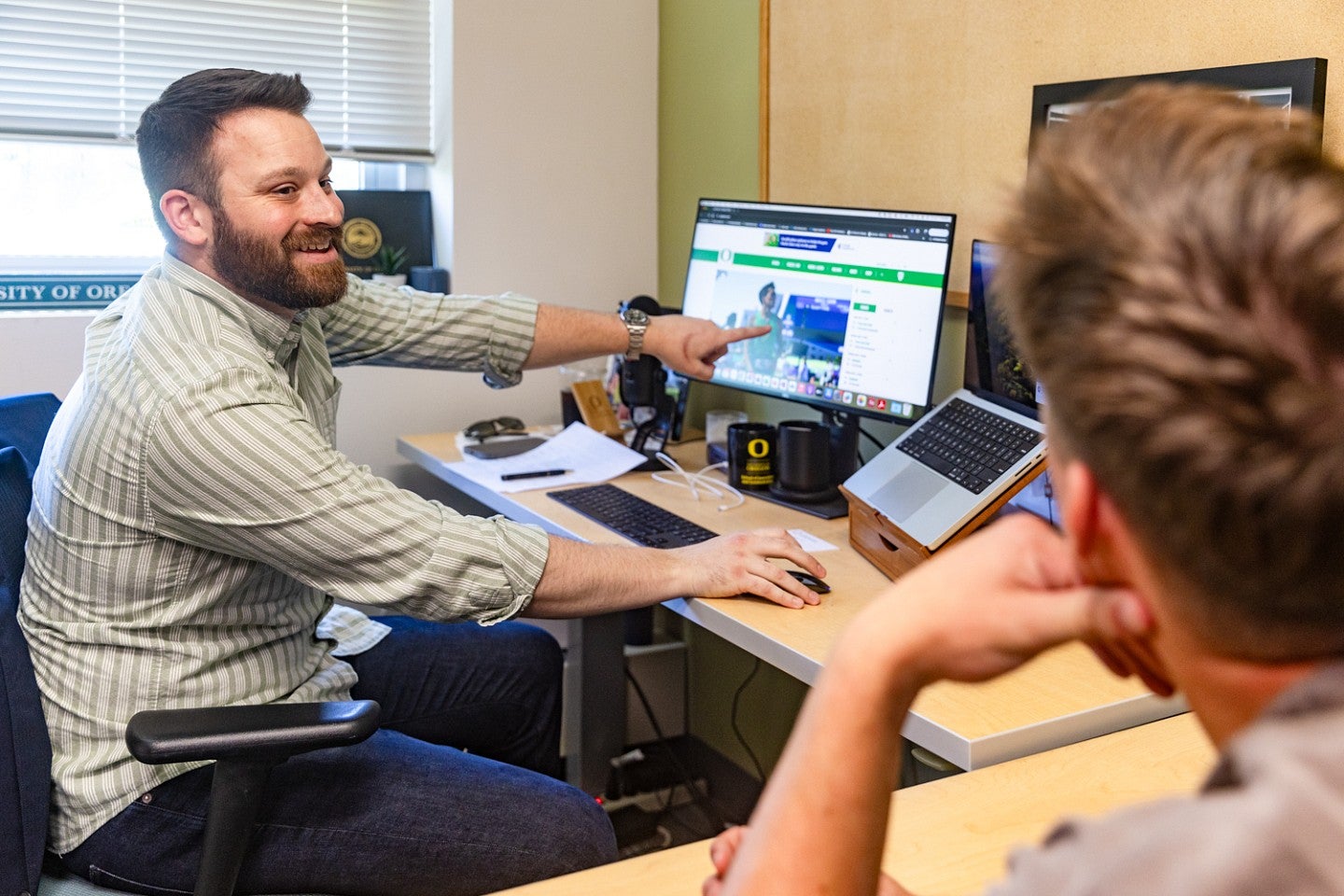Expert offers advice on landing the perfect sports communication job.

The world of sports communication is, in many ways, just as exciting as the games themselves. Storytelling for a favorite team, athlete or brand would be a slam dunk for many students at the UO School of Journalism and Communication (SOJC). But how can they break into this competitive, fast-paced industry? Luckily, Allen Hall is home to our very own sports communication MVP — Assistant Professor Henry Wear ’12.
Like many of our Ducks, Wear grew up a lifelong sports fan — but it was his part-time job at the Eugene Nike store while getting his undergraduate degree in economics at UO that “fueled his desire” for a career in sports. He first used his communication talents working for the University of Kansas’ Jayhawks basketball team before landing a media relations role for the Kansas City Royals. Then his passion for athletics led him back to the classroom, where he earned his Ph.D. in sports management (that's right, it’s Dr. Wear to you).
Needless to say, Wear knows what he’s talking about, and we were lucky enough to chat with him about the types of jobs in the field, how to stand out in this competitive sector and his advice for landing a dream career in sports PR.

1. What types of jobs can you score?
Wear says there are many paths to land the perfect sports or PR job. Some options to consider include:
- Media relations
- On-site activation
- Marketing
- Brand partner and sponsor communication
- Athlete and brand editorial
- Broadcast roles (both on-air and running production behind the scenes)
No matter your skill set or niche interest, there’s a role waiting for you in sports communications. Wear suggests you identify “what piece of sports gets you excited” before you hit the ground running.
2. Hitting it out of the park
Now that you know your options, how do you break into this competitive industry? Wear suggests you start by learning to be flexible. “Understand that there’s different ways to work in sports,” he said. Looking at that huge list above, think about what makes you passionate about the sports industry. Wear cautions that it should be more than just wanting to watch games for a living. If you make this your career, you’ll spend your days working the games rather than watching from the stands.
He says it’s also crucial that you learn the art of being adaptable and able to take on various responsibilities. “Folks at sports organizations are attracted to individuals who are a one-stop communication shop,” Wear said. “You should know how to use a camera, how to do social, how to do digital, how to write, and all the cool software.” These are the skills that will set you apart from your competitors.
3. Dribbling between work and life
A career in the industry is a dream for many, but what does a work-life balance look like in this field? Wear says you won’t be working a typical 9-5 shift. On game days, in most sports PR positions, plan to start bright and early to prepare for the day and expect to leave long after fans have exited. Then be ready to do it all again tomorrow.
The sports life often means missing birthdays, weddings and family events. He also says that, since it’s a field so many are fighting to break into, the pay isn’t as rewarding as other sectors. That’s why it’s crucial that you’re passionate about your work.
So what makes it all worth it? Well, the seasonality of being involved in athletics is a plus for Wear. “They don’t play all year round, so you do get some reprieve that 9-5 folks don’t get,” he said.
But really, he explained, it’s the “stadium full of fans, the athletes, the game itself — it’s the energy you get from that that fuels you through those long hours. There’s not another avenue in PR that has that.”
If you’re interested in sports communications and Wear’s work, be sure to check out his Sports PR Topic course in the fall!
—By Jillian Gray, class of ’25
Jillian Gray is a public relations major and works as an intern for the SOJC Communication team. She also serves as an executive member of the UO PRSSA chapter. Outside of Allen Hall, she loves to read and explore new places. Connect with her on LinkedIn.
